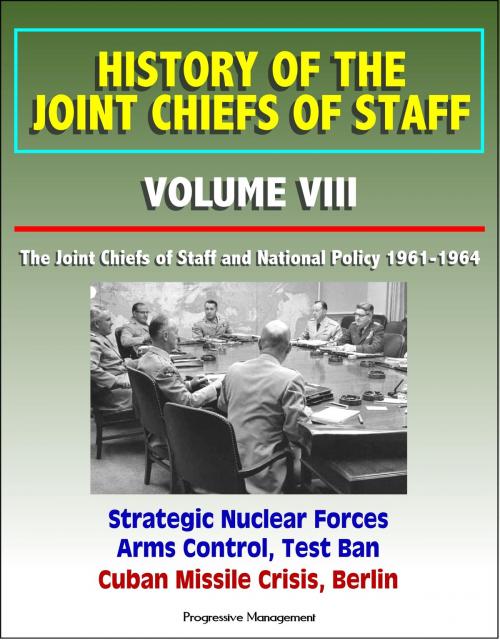History of the Joint Chiefs of Staff: Volume VIII: The Joint Chiefs of Staff and National Policy 1961-1964 - Strategic Nuclear Forces, Arms Control, Test Ban, Cuban Missile Crisis, Berlin
Nonfiction, History, Military, Nuclear Warfare, United States| Author: | Progressive Management | ISBN: | 9781301208425 |
| Publisher: | Progressive Management | Publication: | September 27, 2013 |
| Imprint: | Smashwords Edition | Language: | English |
| Author: | Progressive Management |
| ISBN: | 9781301208425 |
| Publisher: | Progressive Management |
| Publication: | September 27, 2013 |
| Imprint: | Smashwords Edition |
| Language: | English |
Throughout the early 1960s, the Joint Chiefs of Staff confronted a series of crises that touched nearly every part of the globe. Cuba, Berlin, the Congo, Saudi Arabia, India, Indonesia, Laos, and South Vietnam all became areas of confrontation. The worldwide scope of these challenges created, among US policymakers, a mindset in which failure anywhere would have repercussions everywhere.
What most concerned the JCS was an apparent erosion of US credibility that emboldened communist leaders to pursue more adventurous policies. President John F. Kennedy and Secretary of Defense Robert S. McNamara pursued what they conceived as more flexible approaches to strategy and crisis management. The JCS, however, worried that civilian leaders might lack the determination to do whatever became necessary to achieve success. McNamara's managerial reforms, which centralized decision-making in the Office of the Secretary of Defense, added to the friction in civil-military relations.
During 1961-1962, relations between the JCS and their civilian superiors were often awkward and even confrontational. A failure in communications contributed to the Bay of Pigs debacle. The appointment of General Maxwell D. Taylor as Chairman, in October 1962, ameliorated the situation. Taylor expressed deep regard for McNamara, which the Secretary reciprocated. From the civilians' perspective, Taylor's main achievements lay in controlling the Service Chiefs during the missile crisis and securing their support for the Limited Test Ban Treaty. Yet that improvement proved temporary and personal, not institutional and permanent.
This volume is the first in this series to have benefitted from meetings between the author and some of the Chiefs whom he describes. These took place during the middle and later 1970s.
-
Entering the New Frontier: Men and Methods * 2. Strategic Priorities Undergo Major Changes * 3. Strategic Nuclear Forces: "Superiority" Versus "Assured Destruction" * 4. Continental Defense: Still Feasible? * 5. Conventional Capabilities Expand * 6. Disarmament Gives Way to Arms Control * 7. Nuclear Testing: Start and Stop * 8. The Cuban Debacle * 9. The Laotian Precipice * 10. The Berlin Confrontation * 11. The Cuban Missile Crisis * 12. NATO: Advocating New Approaches * 13. NATO: Initiatives Falter * 14. Paring the Military Assistance Program * 15. Latin America: Containment and Counter-Insurgency * 16. Middle East Kaleidoscope * 17. "New Africa" and the Congo Entanglement * 18. South Asia: Contradictions of Containment * 19. The Far East: Seeking a Strategy * 20. Conclusion: Appraising Performances
-
Entering the New Frontier: Men and Methods * The Young Men Meet the Old * New Methods: At the White House * New Methods: At the Pentagon * Adjusting the JCS Program for Planning * 2. Strategic Priorities Undergo Major Changes * Conventional Capability Emphasized; Basic National Security Policy Aborted * Focusing on Counterinsurgency * The SIOP: Striving for a Controlled Response * Summation * 3. Strategic Nuclear Forces: "Superiority" Versus "Assured Destruction" * The "Missile Gap" Is Reversed * Force Planning in 1961 * Force Planning in 1962 * Force Planning in 1963 * Force Planning in 1964 * Summation * 4. Continental Defense: Still Feasible? * An Outdated Posture * Force Planning in 1961 * Force Planning in 1962 * Force Planning in 1963 * Force Planning in 1964 * 5. Conventional Capabilities Expand * At the Outset, Small Steps * Force Planning in 1961 * Force Planning in 1962 * Force Planning in 1963 * Force Planning in 1964 * Summation * 6. Disarmament Gives Way to Arms Control * The Creation of ACDA * Formulating a Disarmament Plan * Some Small Steps * Examining an SNDV Freeze * Summation * 7. Nuclear Testing: Start and Stop * How Long to Abstain? * Testing Resumed: Who Benefited More
Throughout the early 1960s, the Joint Chiefs of Staff confronted a series of crises that touched nearly every part of the globe. Cuba, Berlin, the Congo, Saudi Arabia, India, Indonesia, Laos, and South Vietnam all became areas of confrontation. The worldwide scope of these challenges created, among US policymakers, a mindset in which failure anywhere would have repercussions everywhere.
What most concerned the JCS was an apparent erosion of US credibility that emboldened communist leaders to pursue more adventurous policies. President John F. Kennedy and Secretary of Defense Robert S. McNamara pursued what they conceived as more flexible approaches to strategy and crisis management. The JCS, however, worried that civilian leaders might lack the determination to do whatever became necessary to achieve success. McNamara's managerial reforms, which centralized decision-making in the Office of the Secretary of Defense, added to the friction in civil-military relations.
During 1961-1962, relations between the JCS and their civilian superiors were often awkward and even confrontational. A failure in communications contributed to the Bay of Pigs debacle. The appointment of General Maxwell D. Taylor as Chairman, in October 1962, ameliorated the situation. Taylor expressed deep regard for McNamara, which the Secretary reciprocated. From the civilians' perspective, Taylor's main achievements lay in controlling the Service Chiefs during the missile crisis and securing their support for the Limited Test Ban Treaty. Yet that improvement proved temporary and personal, not institutional and permanent.
This volume is the first in this series to have benefitted from meetings between the author and some of the Chiefs whom he describes. These took place during the middle and later 1970s.
-
Entering the New Frontier: Men and Methods * 2. Strategic Priorities Undergo Major Changes * 3. Strategic Nuclear Forces: "Superiority" Versus "Assured Destruction" * 4. Continental Defense: Still Feasible? * 5. Conventional Capabilities Expand * 6. Disarmament Gives Way to Arms Control * 7. Nuclear Testing: Start and Stop * 8. The Cuban Debacle * 9. The Laotian Precipice * 10. The Berlin Confrontation * 11. The Cuban Missile Crisis * 12. NATO: Advocating New Approaches * 13. NATO: Initiatives Falter * 14. Paring the Military Assistance Program * 15. Latin America: Containment and Counter-Insurgency * 16. Middle East Kaleidoscope * 17. "New Africa" and the Congo Entanglement * 18. South Asia: Contradictions of Containment * 19. The Far East: Seeking a Strategy * 20. Conclusion: Appraising Performances
-
Entering the New Frontier: Men and Methods * The Young Men Meet the Old * New Methods: At the White House * New Methods: At the Pentagon * Adjusting the JCS Program for Planning * 2. Strategic Priorities Undergo Major Changes * Conventional Capability Emphasized; Basic National Security Policy Aborted * Focusing on Counterinsurgency * The SIOP: Striving for a Controlled Response * Summation * 3. Strategic Nuclear Forces: "Superiority" Versus "Assured Destruction" * The "Missile Gap" Is Reversed * Force Planning in 1961 * Force Planning in 1962 * Force Planning in 1963 * Force Planning in 1964 * Summation * 4. Continental Defense: Still Feasible? * An Outdated Posture * Force Planning in 1961 * Force Planning in 1962 * Force Planning in 1963 * Force Planning in 1964 * 5. Conventional Capabilities Expand * At the Outset, Small Steps * Force Planning in 1961 * Force Planning in 1962 * Force Planning in 1963 * Force Planning in 1964 * Summation * 6. Disarmament Gives Way to Arms Control * The Creation of ACDA * Formulating a Disarmament Plan * Some Small Steps * Examining an SNDV Freeze * Summation * 7. Nuclear Testing: Start and Stop * How Long to Abstain? * Testing Resumed: Who Benefited More















